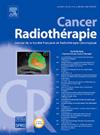Radiotherapy of pancreatic cancers: 2025 update
IF 1.4
4区 医学
Q4 ONCOLOGY
引用次数: 0
Abstract
We present the updated recommendations of the French Society of Radiotherapy Oncology (Société française de radiothérapie oncologique, SFRO) on radiotherapy for pancreatic cancer. The place of radiation therapy in the treatment of patients with resectable or locally advanced pancreatic cancer is still controversial. In the postoperative setting, the standard treatment is adjuvant chemotherapy with 5-fluorouracil, irinotecan and oxaliplatin (“folfirinox” regimen) for 6 months. Adjuvant chemoradiotherapy may be beneficial for patients with N0 cancer. After induction chemotherapy, neoadjuvant chemoradiotherapy is used for borderline tumours in order to increase the chances of complete resection (R0) even if its benefit on patient survival has not been demonstrated. For locally advanced tumours, induction chemotherapy followed in non-progressive patients by chemoradiotherapy increases local control and the chances of resectability. Intensity-modulated radiotherapy reduces the doses received by organs at risk. Tumour movements related to breathing must be taken into account. Stereotaxic radiotherapy increases the dose received by the tumour while protecting neighbouring healthy organs.
胰腺癌放疗:2025年更新
我们提出了法国放射肿瘤学学会(societsfranaise de radiothacrirapie oncologique, SFRO)关于胰腺癌放射治疗的最新建议。放射治疗在可切除或局部晚期胰腺癌患者的治疗中的地位仍然存在争议。术后标准治疗为5-氟尿嘧啶、伊立替康和奥沙利铂辅助化疗(folfirinox方案)6个月。辅助放化疗可能对无癌患者有益。诱导化疗后,新辅助放化疗用于边缘性肿瘤,以增加完全切除(R0)的机会,即使其对患者生存的益处尚未得到证实。对于局部晚期肿瘤,诱导化疗后,非进展患者的放化疗增加了局部控制和可切除的机会。调强放疗可减少危险器官接受的剂量。与呼吸有关的肿瘤运动必须考虑在内。立体定向放射治疗增加肿瘤接受的剂量,同时保护邻近的健康器官。
本文章由计算机程序翻译,如有差异,请以英文原文为准。
求助全文
约1分钟内获得全文
求助全文
来源期刊

Cancer Radiotherapie
医学-核医学
CiteScore
2.20
自引率
23.10%
发文量
129
审稿时长
63 days
期刊介绍:
Cancer/radiothérapie se veut d''abord et avant tout un organe francophone de publication des travaux de recherche en radiothérapie. La revue a pour objectif de diffuser les informations majeures sur les travaux de recherche en cancérologie et tout ce qui touche de près ou de loin au traitement du cancer par les radiations : technologie, radiophysique, radiobiologie et radiothérapie clinique.
 求助内容:
求助内容: 应助结果提醒方式:
应助结果提醒方式:


